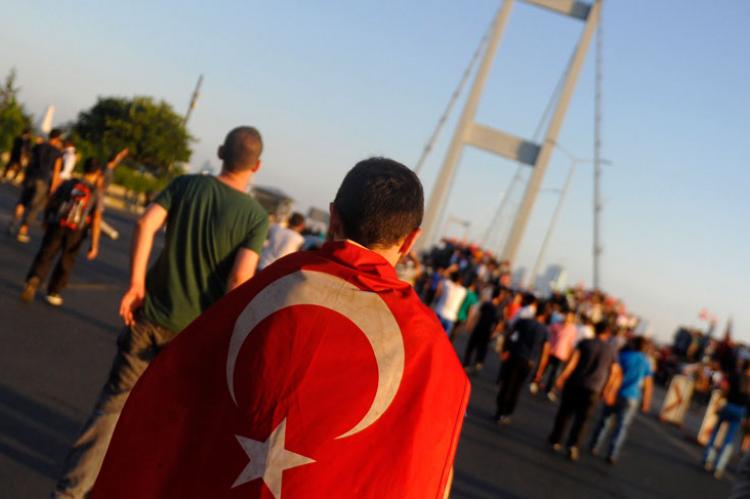Claim: Turkey engaging in ‘counter-coup’
2016-12-06 08:26 GMT
Posted in:
An editorial published by the Guardian claims that Turkey is engaging in a 'counter-coup' against political opponents
In an editorial entitled ‘The Guardian view on Turkey’s repression: stop this stalemate,' the Guardian made a number of claims regarding the current situation in Turkey. Arguing that “post-coup crackdowns in Turkey” are wrong and risk putting relations with Europe in jeopardy, the Guardian is neglecting the fact that current situation in Turkey should be analyzed in context of the July 15 failed coup attempt and Turkey's struggle against terrorism.
Stating that Turkish President Recep Tayyip Erdogan has subjected his opponents to “sweeping political purges,” the Guardian has overlooked the nature of the coup and the alleged organization responsible. The organization which Turkey holds responsible for the coup, the Fethullah Gulen Terror Organisation (FETO), is a wide network whose influence extends into to the state bureaucracy and the armed forces. Fact Checking Turkey has previously presented evidence which appears to confirm FETO’s involvement in the coup.1
Due to the secretive nature of the network and the alleged crimes attributed to it, judicial authorities have launched a thorough investigation into the alleged activities of FETO which range from assassinations, conspiracies against members the government and armed forces, and the 15 July coup attempt. Contrary to the Guardian’s claim that Turkish President Erdogan has “orchestrated what amounts to a counter-coup,” both the arrests and the present state of emergency are in line with the law as stipulated by the relevant articles of the constitution,2 and are subject to parliamentary approval.3 The extension of the state of emergency was likewise backed by the opposition Nationalist Movement Party (MHP),4 and by Turkey's National Security Council (MGK), a body comprised of representatives of the government and branches of Turkey's security and military apparatus.5
The failed coup came at a time when Turkey was struggling against the outlawed Kurdistan Workers’ Party (PKK), an armed organization which since 1984 has been conducting a terrorist campaign against the Turkish state. The Guardian, however, hints that it objects to the struggle against both FETO and the PKK as arrested suspects linked to both have found themselves “bracketed with Isis (DAESH) militants.” However, Turkey and several international bodies have designated both organisations to be terrorist organisations.6
- 1. http://factcheckingturkey.com/failed-coup/claim-evidence-gulen-mastermin...
- 2. http://file.setav.org/Files/Pdf/20160809162358_the-declaration-of-the-st...
- 3. http://www.dailysabah.com/legislation/2016/07/21/turkeys-parliament-form...
- 4. http://www.dailysabah.com/war-on-terror/2016/09/30/opposition-leader-bac...
- 5. http://www.dailysabah.com/war-on-terror/2016/09/29/extension-of-state-of...
- 6. http://www.dailysabah.com/war-on-terror/2016/10/19/organization-of-islam...



